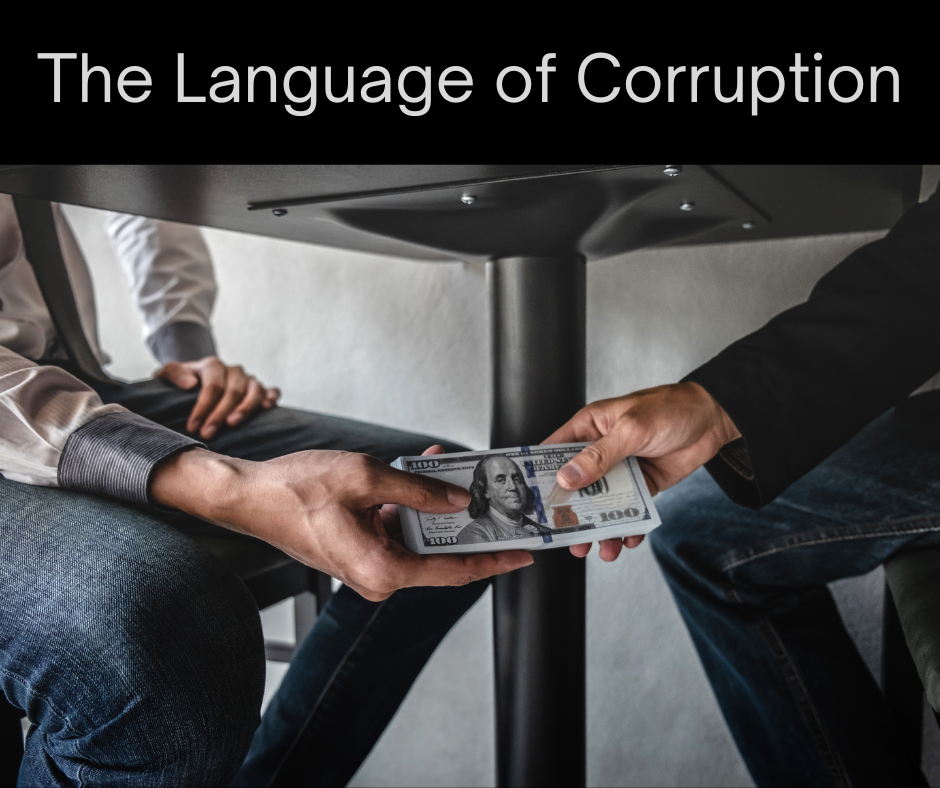
In today’s podcast, you’ll learn vocabulary connected to corruption. We’ll explain why the suffix ‘gate’ is used to label scandals and we’ll look at some words you can use when you talk about this topic.
Voice message from Walter from Belgium
Thank you XaboutX FOR your podcast
Gate
Gate (noun): A hinged barrier used to close an opening in a wall, fence, or hedge.
Example: She pushed the garden gate open and walked in.
Gate (noun): The part of an airport where passengers board and disembark from an airplane.
Example: Flight 801 is now boarding at gate 3.
The suffix “-gate” can be added to words to denote a scandal, particularly in politics and government. It originates from the Watergate scandal in the United States in the 1970s
Covidgate – could be used informally to describe any controversy related to COVID-19. For instance, “Partygate” was a political scandal in the UK about gatherings of government and Conservative Party staff during the COVID-19 pandemic in 2020 and 2021, when public health restrictions prohibited most gatherings.
Qatargate – a political scandal involving allegations that European Parliament officials, lobbyists, and their families were influenced by the governments of Qatar, Morocco, and Mauritania, engaging in corruption, money laundering, and organized crime.
Russiagate – used informally to describe the controversy and investigation after the 2016 US presidential election regarding the discovery of many secretive links between Trump associates and Russian officials.

The Watergate scandal was a major political controversy that erupted during the presidency of Richard Nixon, involving illegal activities such as a break-in at the Democratic National Committee headquarters at the Watergate complex and subsequent efforts to cover it up. It led to Nixon’s resignation in 1974 after investigations revealed that he had sanctioned plans to obstruct justice
The name “Watergate” comes from the hotel in Washington, D.C. where the first crime and break in took place, and is often associated with political scandals.
Irangate: Also known as the Iran-Contra affair. This 1980s scandal involved the U.S. secretly selling arms to Iran and using the funds to support anti-communist rebels in Nicaragua.
Koreagate: A 1970s scandal where U.S. lawmakers were bribed by South Korean lobbyists.
FIFA Gate: A massive bribery scandal involving international soccer’s governing body in the 2010s.
Deflategate: A controversy in American football where a team allegedly used underinflated footballs for an advantage.
Nipplegate: The infamous incident where Janet Jackson’s breast was exposed during a Super Bowl halftime show.
Corruption vocabulary
Bribery: The act of offering, giving, receiving, or soliciting something of value to influence an action.
Example: The politician was caught in a bribery scandal after accepting money to pass legislation.
Embezzlement: Theft or misappropriation of funds placed in one’s trust or belonging to one’s employer.
Example: The accountant was charged with embezzlement for diverting company funds into his personal account.
Kickback: A payment made to someone who has facilitated a transaction or appointment, often illegally.
Example: He received a kickback for awarding the construction contract to a particular firm.
Money laundering: The process of concealing the origins of money obtained illegally by passing it through a complex sequence of banking transfers or commercial transactions.
Example: The criminal organization was involved in money laundering to disguise the profits from their illegal activities.
Nepotism: Favoritism granted to relatives or friends, especially by giving them jobs.
Example: Nepotism at the company led to unqualified individuals being hired over more deserving candidates.
Whistleblower: A person who informs on a person or organization engaged in illicit activities.
Example: The whistleblower exposed the corruption within the government agency, leading to several arrests. (Edward Snowdon, Julian Assange)
Conflict of interest: A situation in which a person is in a position to derive personal benefit from actions or decisions made in their official capacity.
Example: The judge recused herself from the case due to a conflict of interest involving a relative.
Under-the-table: Done secretly and typically illegally.
Example: The under-the-table deal ensured that the inspector would overlook the building’s code violations.
Illicit funds: Money earned or obtained in violation of laws or regulations.
Example: The illicit funds were laundered through a series of shell companies to hide their origin.
Integrity: The quality of being honest and having strong moral principles.
Example: The new leader was praised for her integrity and commitment to ethical governance.
Misappropriation: The intentional, illegal use of another’s funds or property.
Example: The charity director was fired for the misappropriation of donations meant for disaster relief.
Extortion: The practice of obtaining something, especially money, through force or threats.
Example: The businessman was charged with extortion after he threatened to release sensitive information unless he was paid off.
Racketeering: The act of operating an illegal business or scheme in order to make a profit, typically involving extortion.
Example: The gang was involved in racketeering, running illegal gambling and loan sharking operations.
Profiteering: The act of making an excessive/illegal amount of profit
Example: The pharmaceutical company has been accused of profiteering after suddenly tripling the price of the medication when their only competitor went out of business.
A list of the most corrupt countries on earth:
https://www.transparency.org/en/cpi/2022
In June 2024, Somalia is the most corrupt, while Denmark is the least corrupt.
…and now it’s your turn to practise your English.
Send us a voice message. https://www.speakpipe.com/inglespodcast
Send us an email with a comment or question to [email protected] or [email protected]
If you’re a Spanish speaker and you want to study for free, visit the mansioningles website and for paid eBooks and audios for self-study check out the online store: https://store.mansioningles.net/
Thank you to our Patreon supporters. Join our Patreon program for as little as $1.50 per month and you get instant access to the transcriptions of this podcast. https://www.patreon.com/inglespodcast
Welcome to our new Patreon supporters who have joined us this month:
Maria
Jvilni
Federica Bozza
Cynthia Cepeda Cardenas
Israel Pinilla
Mª Eva Seral Carrasco
Anonymous
In next week’s episode: Retirement and aging
If you enjoyed this podcast, please tell your friends!
The music in this podcast is by Pitx. The track is called ‘See You Later’



